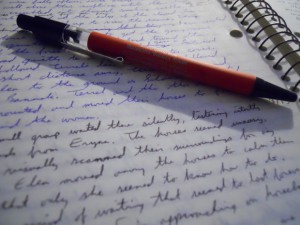 Over the next two weeks I’m running the same blog about first drafts. Last week’s blog was my unabridged first draft. This week’s blog is the same blog, but revised. Hopefully, this will demonstrate the necessity for revision.
Over the next two weeks I’m running the same blog about first drafts. Last week’s blog was my unabridged first draft. This week’s blog is the same blog, but revised. Hopefully, this will demonstrate the necessity for revision.
First drafts – how good are they?
Ernest Hemmingway is quoted as saying, ‘The first draft of anything is shit.’ In the August Busybird newsletter, author Ryan O’Neill said, ‘I hate writing first drafts … First drafts are horrible.’
Compared to what the finished product could be, yes, they are. They’re rough, filled with errors, overwritten in some places and underwritten in others. They can be terrible.
But what would you rather have? A blank page or one filled with words? The words mightn’t be the best words, but they give you raw material that can be shaped. Don’t ever besmirch your first draft. Even if it doesn’t work, it shows you which way not to go.
I don’t see anything wrong with my draft, though …
We see so many stories for [untitled] that are great prospects but rough. So often at content meetings we remark how a story is a draft or two away from serious consideration. Some authors (and I know this from my own experiences) are in such a rush to get their story out into the world, they submit it without taking the time to revise, revise, revise. A lot of times, you get only one shot at submitting to a particular market. Make sure you make the best first impression you can.
Go over your work and go over it and go over it until you feel there’s nothing more you can do. Then put it aside for a week or two (at the least). You’d be amazed what you’ll be able to see once you’ve gotten some space from it.
When you truly can’t get anything more out of it, get opinions from friends – and not just friends who’ll give you a perfunctory, ‘Yeah, it was good.’ Develop relationships with other writers whose opinions you respect. Join a workshopping group. Then work on it some more.
That doesn’t sound glamorous at all
No. Many think writing is about writing a story, finding a publisher, and getting a bestseller. Writing is as much about rewriting (multiplied ad nauseam) as it is about writing. It’s hard. It’s frustrating. You’ll grow to dread revision, fearing you’ll miss something vital, or won’t have the capacity (or skills) for improvement.
A lot of great writers are crippled by self-doubt. This is probably the reason: the insecurity of not getting something right or fearing they won’t be able to.
But the hard work is worth it.
When does it end?
This is a question we get during workshops: ‘When do I call it quits?’ There’s no definitive answer. Every draft – as well as every step in revision – is different. Sometimes you may need to go backwards to go forwards, or sideways to find where you are. Some revisions may take a quantum leap in improvement.
As you go, you’ll also learn the difference between meaningful and meaningless revision. Meaningful revision helps you find your way through a draft. Meaningless revision amounts to tweaking, which you could do forever.
Don’t worry. You’ll develop a recognition of what’s substantive and what’s not, when to revise, when to rest, when to seek feedback, when to let go, and when to submit.
Like any muscle, the more you use it, the stronger it gets.
Happy revision.
Oh, before I forget, a postscript …!
Don’t forget Michelle Endersby’s exhibition Floribunda opened Saturday at the Busybird Publishing Studio ~ Gallery. Check out our Events.
One final aside …
This draft is almost two hundred words shorter than the first draft, which is something else to think about.
LZ.
